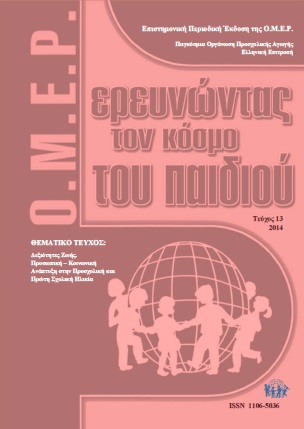AN APPROACH TO THE EMOTIONAL DEVELOPMENT OF PRESCHOOL CHILDREN

Abstract
different multicultural backgrounds (foreigners, Roma) took part attending the school year 2012-2013 in the 3rd Kindergarten in Megara. The reason for implementing the program highlights was the observations of the kindergarten teacher showing significant children’s difficulties in communication, relation development, cooperation and acceptance of others. For the design of the program the children’s initial ideas, parent’s expectations of the program and the data collected with the technique of sociogram were utilized. The program included activities for the recognition and management of basic emotions (joy, sadness, anger, fear), activities to enhance self-image and self-esteem and the development of friendship and conflict management. The results of the
program evaluation highlighted the achievement of learning objectives set and the positive effect it had on children after having noticed a significant change in positive emotional behavior not only on expression, understanding, empathy, but on regulating their emotions as well.
Article Details
- How to Cite
-
Καζέλα (Katerina Kazela) Κ., & Κοντοπούλου Φ. (2014). AN APPROACH TO THE EMOTIONAL DEVELOPMENT OF PRESCHOOL CHILDREN. Investigating the child’s World, 13, 134–143. https://doi.org/10.12681/icw.17930
- Section
- Scientific articles & educational projects

This work is licensed under a Creative Commons Attribution-NonCommercial 4.0 International License.
Authors who publish with this journal agree to the following terms:
· Authors retain copyright and grant the journal right of first publication with the work simultaneously licensed under a Creative Commons Attribution Non-Commercial License that allows others to share the work with an acknowledgement of the work's authorship and initial publication in this journal.
· Authors are able to enter into separate, additional contractual arrangements for the non-exclusive distribution of the journal's published version of the work (e.g. post it to an institutional repository or publish it in a book), with an acknowledgement of its initial publication in this journal.
· Authors are permitted and encouraged to post their work online (preferably in institutional repositories or on their website) prior to and during the submission process, as it can lead to productive exchanges, as well as earlier and greater citation of published work.



